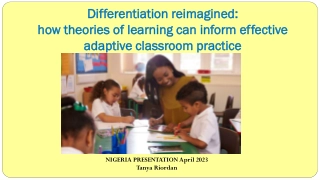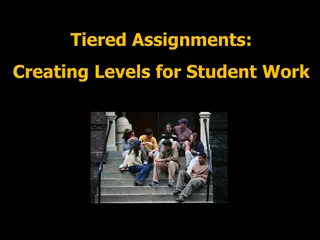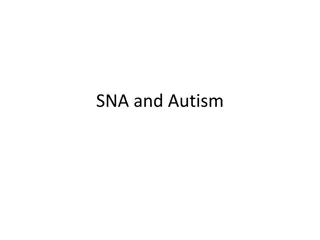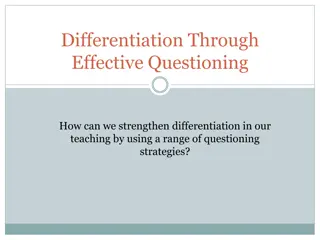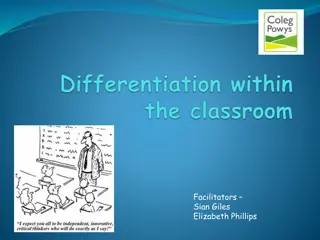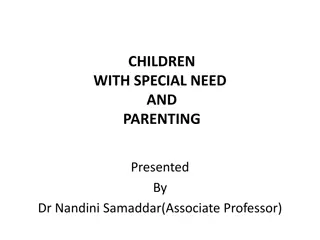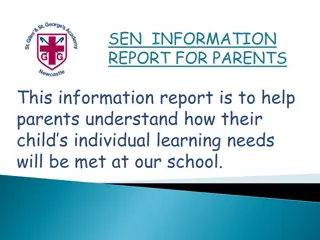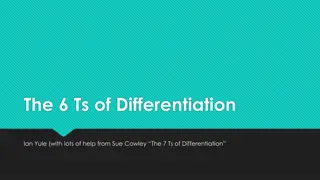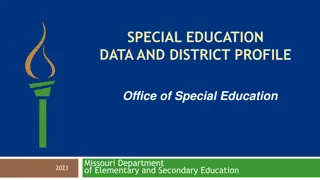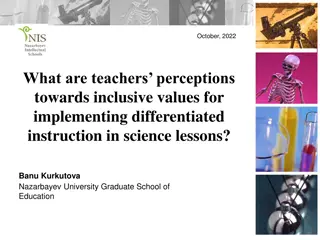Teaching and Differentiation for Children with Special Educational Needs
Understand how to effectively teach and cater to the diverse needs of children with special educational requirements, covering areas such as SEMH, communication, interaction, cognition, learning, and sensory/physical needs. Learn about the importance of high-quality teaching, differentiation strategies, and collaboration with external agencies to ensure inclusive education for all students.
Download Presentation

Please find below an Image/Link to download the presentation.
The content on the website is provided AS IS for your information and personal use only. It may not be sold, licensed, or shared on other websites without obtaining consent from the author.If you encounter any issues during the download, it is possible that the publisher has removed the file from their server.
You are allowed to download the files provided on this website for personal or commercial use, subject to the condition that they are used lawfully. All files are the property of their respective owners.
The content on the website is provided AS IS for your information and personal use only. It may not be sold, licensed, or shared on other websites without obtaining consent from the author.
E N D
Presentation Transcript
Develop an understanding of how we teach and differentiate for children with special educational needs Rachael Carr Deputy Headteacher (Inclusion)
Meet The Team Mrs Baez AHT/SENCo Miss Headen EYFS Phase Leader Laura Goulden Unlocking Potential Miss Buttery Learning Mentor Mr Ward Learning Mentor
The IQM inclusive school award recognises the on- going commitment by schools to provide the very best education for all children irrespective of differences. The overarching aim of Flagship status is that an individual school which has achieved this status can now further its work in Inclusion through internal research activities.
Every teacher is a teacher of special educational needs.
4 areas of SEND: Social, emotions and Mental Health (SEMH) Communication and Interaction Cognition and Learning Sensory and/or Physical Needs
Specialist external agencies Targeted - Interventions Universal High Quality Teaching
High Quality Teaching Knowledge Teaching/Modelling Classroom Climate Classroom Management Training for all staff
Differentiation Modifications of: Content of the lesson How learning is presented Environment Outcome How Orchard differentiate for children with SEND through high quality teaching: Be explicit Range of resources concrete and visual Recapping prior learning and making links Repetition Simplified language Modelling Memory aids task planners
Targeted Interventions Speech and Language Launchpad Sensory Attention Autism Precision Teaching 1:1 Reading Social Skills/Managing feelings Circle of Friends Zones of Regulation Symphony Lexia Staff Training Quality Assurance
Specialist External Agencies Speech and Language Therapists Unlocking Potential therapeutic support Staff Training Quality Assurance Specialist teachers Educational Psychologists
Parental involvement Our school recognises the importance of working in partnership with parents in order to offer quality provision in the area of SEND. The school aims to respond effectively to parental concerns regarding their child s individual needs and act appropriately. The SEND team will aim to develop effective mechanisms for parental involvement and the sharing of information: We aim to: Inform parents when difficulties are first identified by the class teacher. Respond to any concerns raised by parents and arrange meetings with the Head teacher and/or Deputy Head teachers to discuss these. To inform parents about the implementation of Personal Learning Goals. Develop home/school programs for children if the need arises. To inform parents and get their views when the school is considering contacting outside agencies for further advice and support. Direct parents to the appropriate agencies if they want to seek further advice and support themselves. Facilitate meeting between outside agencies are parents when needed


